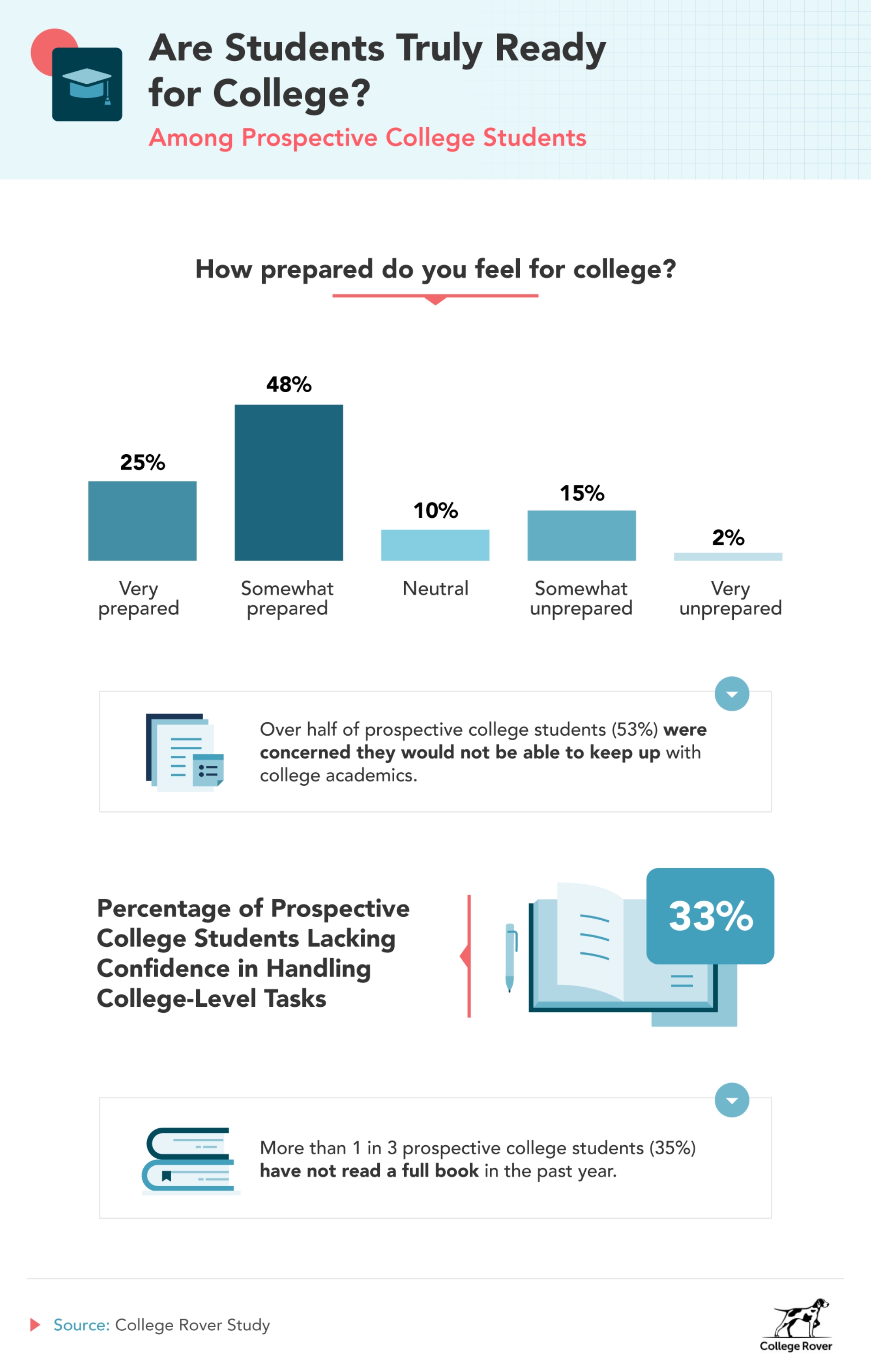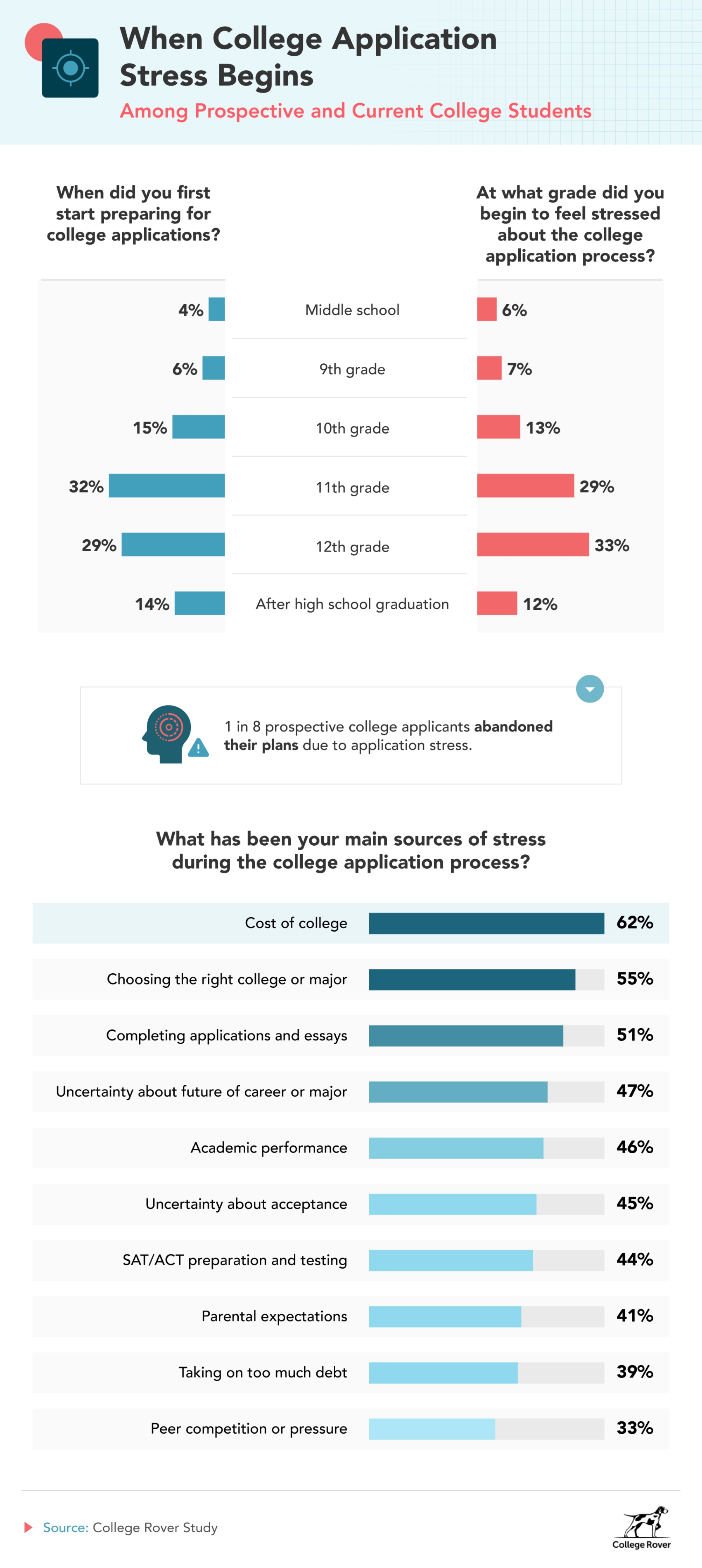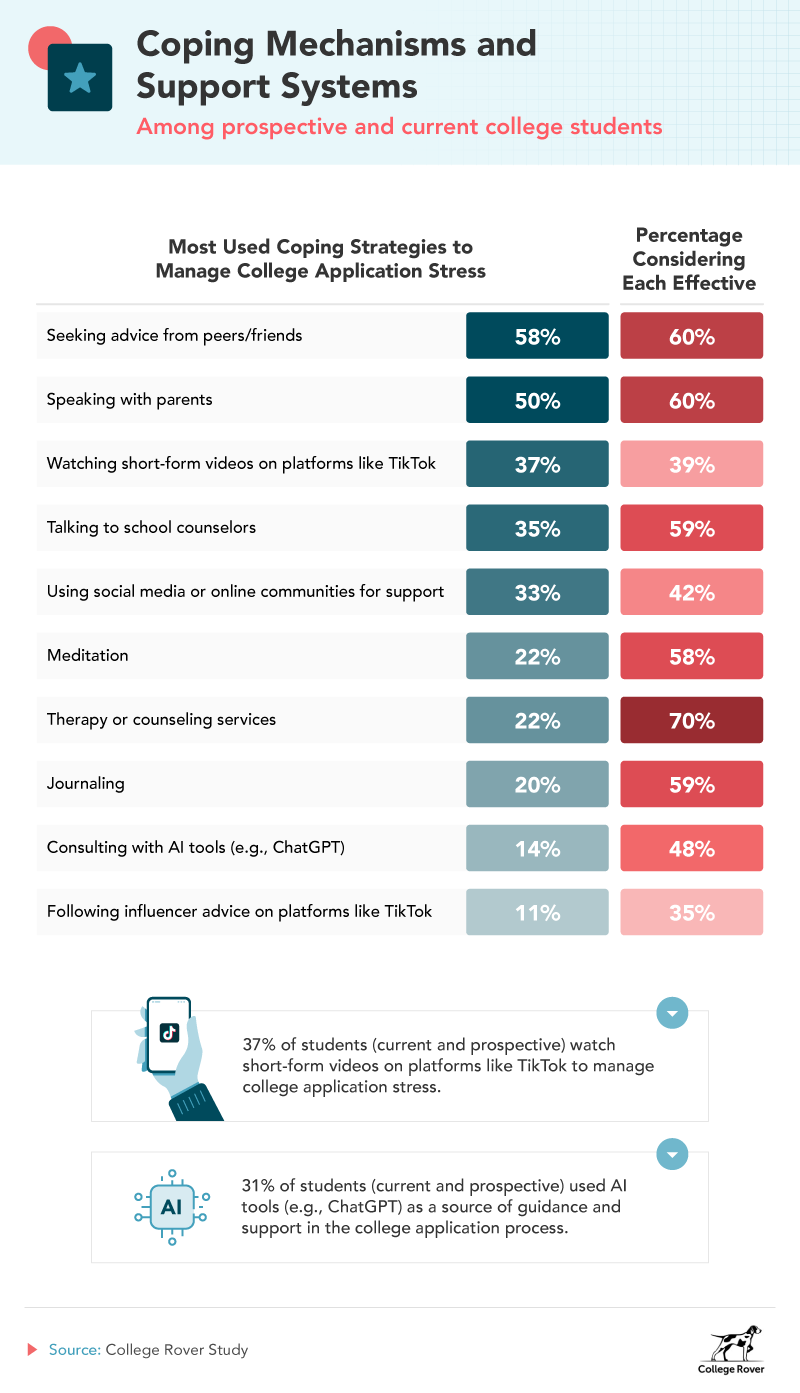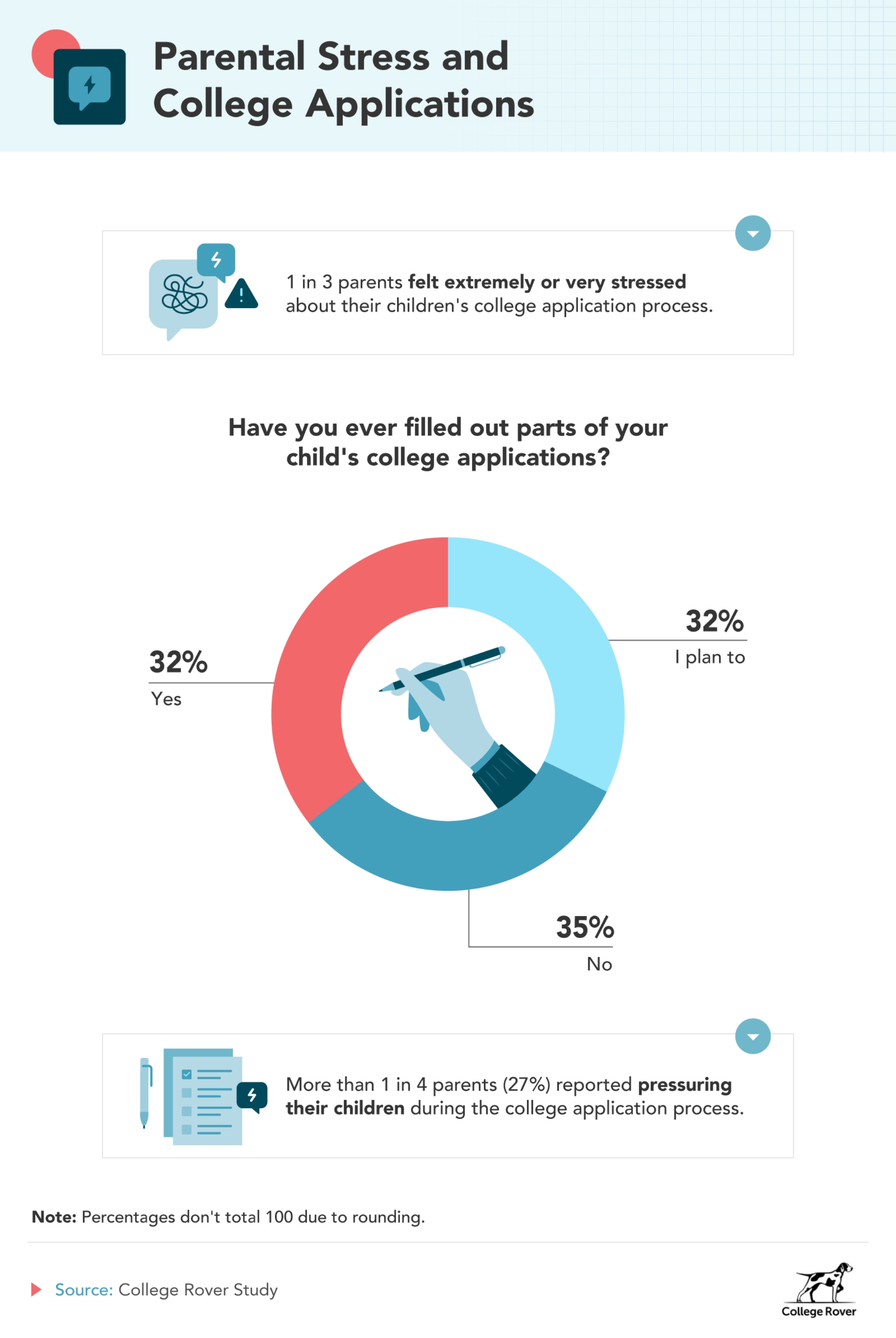The college application process is a rite of passage for many students, but it can also be a major source of stress. Between financial concerns, academic pressure, and uncertainty about the future, it's no wonder this experience leaves many feeling overwhelmed.
This article unpacks the findings of a recent study on the rising pressures of applying to college, revealing why students feel unprepared, how they cope with stress, and even how parents are affected. The more we understand the challenges students face, the better we can support them as they take this big step toward higher education.
Key takeaways
- Only 1 in 4 prospective students feel very prepared for college.
- Over half of prospective students (53%) worry about keeping up with college academics.
- Over 1 in 3 prospective students (35%) have not read a book in the past year.
- 62% of prospective students say the cost of college is their biggest stressor during the application process.
- 1 in 8 prospective college applicants abandoned their plans due to application stress.
- 37% of current and prospective students watch short-form videos on platforms like TikTok to manage college application stress.
- Nearly 1 in 4 current and prospective students attend therapy to cope with application-related anxiety.
- 31% of current and prospective students use AI tools like ChatGPT for college application guidance.
College readiness
The transition from high school to college can feel like stepping into uncharted territory, and for many students, it's a leap they don't feel ready to make. See how prepared - or unprepared - students feel for the academic challenges ahead, with insights into what's causing concerns.

Only 1 in 4 prospective college students reported feeling very prepared to handle the demands of college. Academic readiness was a major concern for over half (53%) of prospective students, who worried they might struggle to keep up with college coursework. Interestingly, 35% admitted they hadn't read a single full book in the past year.
These challenges hit Hispanic/Latino students the hardest. They were the least likely to feel very prepared for higher education and the most likely to be concerned about handling college classes (74%). Asian students stood out as the most confident, with 29% feeling very prepared for the demands of college life.
Prospective college students also pointed to gaps in their high school support systems. Nearly 1 in 3 felt their school didn't provide enough resources to help them transition to college.
Timing & stress of college prep
For many students, the college application process is a pressure cooker - with financial worries, academic challenges, and self-doubt simmering all together.

When applying to schools, the cost of college was the biggest stressor for both current and prospective students (62%). For 1 in 8 applicants, this pressure was so overwhelming that they abandoned their plans to apply.
Among those who pushed forward, half of current and prospective students described their stress as extreme or very high. Stress levels were highest among Asian students (59%), followed by Hispanic/Latino (54%), White (52%), and Black/African American students (40%). More women (55%) than men (43%) reported feeling extreme or very high stress while applying for college.
Women also felt the pressure earlier, with 32% stressing out by 11th grade, while men tended to feel the heat later in 12th grade (37%). Choosing the "right" major or college added to the tension - a concern shared by 60% of women and 47% of men. More women (52%) than men (40%) were worried about their future careers, too.
Some students also lacked essential life and study skills, as they reported not knowing how to do the following.
Don't know how to effectively study for exams:
- Prospective college students: 28%
- Current college students: 24%
Don't know how to handle basic home maintenance tasks:
- Prospective college students: 29%
- Current college students: 34%
Don't know how to use AI tools effectively:
- Prospective college students: 22%
- Current college students: 27%
Don't know how to cook a basic meal:
- Prospective college students: 7%
- Current college students: 10%
Don't know how to do laundry:
- Prospective college students: 6%
- Current college students: 5%
Effective stress coping methods
Managing college application stress isn't easy, but students have found creative and practical ways to cope. From scrolling through TikTok to seeking therapy, they're blending modern tools with traditional resources to get through the process.

Short-form videos on platforms like TikTok have become a source of relief, with 37% of current and prospective college students turning to them to unwind. Therapy was also a key support, with nearly 1 in 4 students attending sessions to help manage their anxiety during the college application process.
Technology is also stepping in to help: 31% of students have used AI tools like ChatGPT during their application process for guidance and support, with Black/African American students (47%) being the most likely to have done so.
White students were the least likely to use AI tools (24%) but the most likely to seek help from school counselors (65%). Meanwhile, Hispanic/Latino students were the least likely to turn to a counselor (38%). Students' various coping methods show just how resourceful they can be - blending personal support, technology, and even social media to navigate the challenges of applying to school.
Parental perspectives
The college application process doesn't just weigh on students - parents feel the stress, too. While families navigate this challenging time, some key strategies can make the process smoother and more manageable for everyone involved.

Parents who had already experienced the college application process had some words of wisdom to share. Here's their top advice:
- Start preparing early: 57%
- Stay organized and keep track of deadlines: 54%
- Set clear expectations about costs and college choices: 53%
- Encourage your child to take ownership of the process: 50%
- Understand the application timeline: 50%
Parents also suggested focusing on financial aid and scholarship research (49%) and leveraging online resources (45%). Communication also stood out as a must. Open discussions about goals and expectations were encouraged by 44%, while 43% highlighted the value of visiting campuses - either in-person or virtually.
Seeking help from school counselors was equally recommended (43%), as was taking breaks to keep stress from overwhelming the family (34%).
Understanding and addressing college stress
The college application process is a high-stakes challenge that impacts students and their families alike. From financial and academic worries to gaps in readiness, students are navigating a complex maze of pressures.
Thankfully, many are finding ways to manage the journey - whether through therapy, technology, or traditional support systems like school counselors and parents. Addressing top stressors and filling gaps in support systems can help students face the application process with more confidence, setting them up for success in college and beyond.
Methodology
We surveyed 1,002 Americans in November 2024 to examine the growing pressures students face during the college application process. Our respondents included 21% prospective college students, 52% current college students, and 28% parents. Among the student respondents, 46% identified as men and 54% as women. The racial and ethnic breakdown was as follows: 16% Asian, 24% Black/African American, 10% Hispanic/Latino, and 50% White.
About College Rover
College Rover is a unique comparison tool that empowers students and parents to make informed decisions about higher education. Focusing on objective data like tuition, admission standards, and graduation rates, College Rover helps users navigate the college selection process with confidence and ease.
Fair use statement
These findings on the rising pressures of the college application process can be shared for educational or noncommercial purposes, provided proper credit is given to College Rover. Please provide your readers with a link to this page.






















